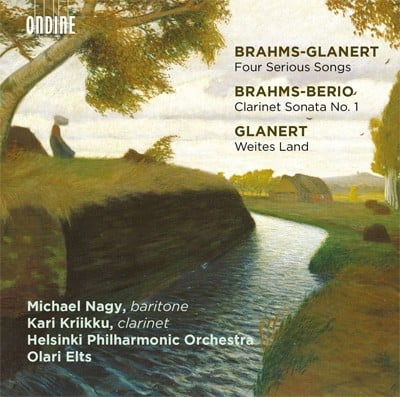Vier Präludien und Ernste Gesänge
(Four Preludes and Serious Songs) (2004/2005)3.2.2.2.dbn-4.2.3.0-timp-harp-strings
Abbreviations (PDF)
Bote & Bock
"The way Glanert has linked the four songs through interludes is ingenious: in a manner of speaking, he has woven them into a musical crown of thorns which never lacks taste and placed them lovingly on Brahms’ head. It does not hurt but instead looks quite becoming." (Klaus Geitel, Berliner Morgenpost, 29 Jun 2005)
"Glanert not only orchestrates Brahms’s songs but expands on them, adding an introduction and linking interludes. In the hands of a more egotistical composer this would be disastrous, but Glanert shows both affection and respect. Transplanted into a vast concert hall, the songs may lose some of their introspection, but they seemed here to gain a sense of universality. Glanert uses orchestral colours recalling those of the Deutsches Requiem, and the joins between his music and Brahms’s are seamless. The prelude to the first song, which compares the deaths of men and beasts, begins with elemental, low double basses and rustic violas, then spirals upwards in agitation. Before the third song, O Tod, itchy violins whip up the orchestra into an almost grotesque, fleeting waltz – a dance of death... The end result is intensely moving, as evidenced in the long audience silence at the end." (Erica Jeal, The Guardian, 31. Jul 2006)
"Glanert has fashioned, with respect and imagination, something considerably more than ‘four songs orchestrated’. With the addition of four original preludes, and a postlude, Glanert seems to offer a microcosm of German music that embraces Richard Strauss and the Mahler of the Tenth Symphony together with expression of our own times. Such overlays invoked similar treatments as effected by Luciano Berio... Playing continuously for 25 minutes, Glanert’s orchestration of, and additions to, Brahms’s wonderfully eloquent and searching song-settings is both focussed to Brahms’s intentions and sensibility yet looks beyond that in distinct yet related styles. Given here a performance that left no doubt as to Glanert’s achievement, or the requirement to hear even more of his music, the singing of Johan Reuter also left an indelible impression... In short, a triumph." (Colin Anderson, The Classical Source, 28 Jul 2006)

Michael Nagy / Helsinki Philharmonic Orchestra / Olari Elts
Ondine ODE 1263-2
